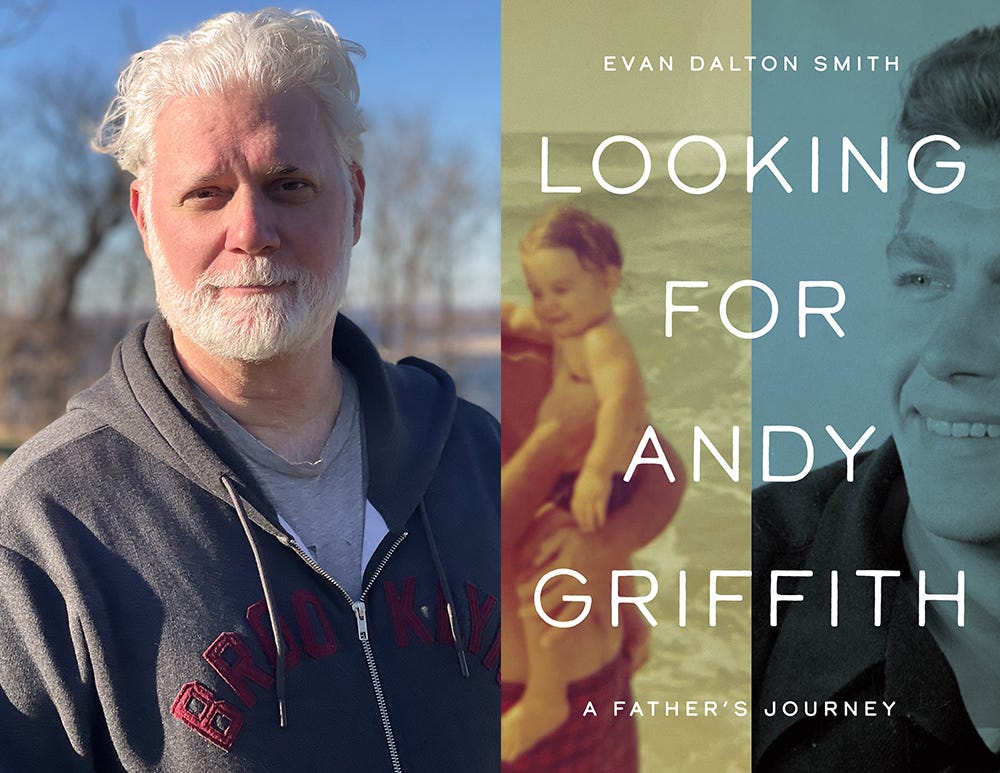Today’s guest is the writer and poet Evan Dalton Smith. His first book—part personal story and part cultural study—is called Looking for Andy Griffith: A Father’s Journey.
We talk about the healing power of nostalgia, finding personal resilience, and the pursuit of meaningful storytelling. We also discuss how Evan took an 8,200-word essay, originally published in 2013, and turned it into a full-length manuscript. And we talk about Andy Griffith's impact on pop culture, Evan's own experiences with father figures, and the challenges of writing a book through life’s upheavals.
Evan’s story exemplifies the intense and highly personal journey of finishing a book—and how unexpected things happen when you embark on the journey.
“When we first met, [my agent said], ‘this is a weird little book, but you can make a career out of writing a lot of weird little books.’” —Evan Dalton Smith
Listen on Substack…or here:
Key Takeaways for Writers
The book explores the power of cultural nostalgia: Nostalgia is a power force in our media consumption. And The Andy Griffith Show is a rare phenomenon, like Star Trek or the Twilight Zone, in that its become a touchstone for many generations of viewers. Even in the 1960s, the show’s writers were feeling nostalgic—for them, the show’s setting and characters were based on their own experiences of the 1930s.
Evan's personal connection to the show is rooted in his childhood experiences of loss and search for father figures. Evan’s father was tragically killed in an car crash when he was 5, and his mother grew dependant on narcotics. Discovering The Andy Griffith Show provided something stable missing at home. What Evan discovered writing this book is that the show’s mythic, idealized version of small-town America has provided a similar balm for its many fans.
The journey of transforming an essay into a book-length manuscript can be a tough one. Transforming an essay into a full-length book can be fraught with challenges, especially when it involves personal stories interwoven with cultural analysis. Part of the issue is simply the way real-life tends to intervene.
Writing a book that balances cultural inquiry with personal narrative means pushing past discomfort about sharing your own story. “I did struggle putting myself into the narrative…I added a lot more about my life than I intended to,” he says.
Sometimes one book project will point to the next one. In this book, Evan explored his mother’s struggle with narcotics, something he hadn’t originally planned to do. But it also laid the groundwork for his next book, which will wrestle with the personal and cultural costs of this particular drug.
Evan’s story dramatizes the very real life struggles many authors face to balance their writing with their life. Over the decade of this book’s journey, Evan went through an unexpected divorce and relocation, and he found himself working multiple jobs. In the end, it’s always about figuring out figuring out how to make use of little bits of time and learning to become more resourceful.
"I learned to write on my phone, which is annoying for the people in my life [who] think I'm just, you know, jerking around on my phone. But a lot of times I'm working." —Evan Dalton Smith
About Evan Dalton Smith
Evan’s writing has appeared in the Washington Post, LA Times, Slate, Salon, LA Review of Books, Paris Review, Ploughshares, The New Yorker, and elsewhere. Formerly, he served as Associate Web Editor at Poets & Writers, Inc., and Director of Publications for the Student Press Initiative at Teachers College, Columbia University. Originally a native of North Carolina, he now lives in Ipswich, Massachusetts. Looking for Andy Griffith: A Father’s Story is his first book.
Discussed on this episode
Looking for Andy Griffith: A Father’s Story UNC Press | Bookshop | Amazon
Our Town: Andy Griffith and the Humor of Mourning, Los Angeles Review of Books, April 20, 2013
“Ten Questions for Evan Dalton Smith,” Poets & Writers, May 28, 2024
Out of Sheer Rage, by Geoff Dyer
Another Bullshit Night in Suck City, by Nick Flynn
Sherman’s March, the funny, classic 1985 documentary by Ross McElwee (a must-watch!)
Credits
This episode was produced by Magpie Audio Productions. Theme music is "The Stone Mansion" by BlueDot Productions.













Share this post